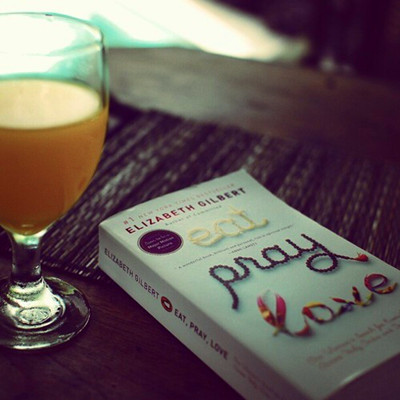
The next morning in meditation, all my caustic old hateful thoughts come up again. I'm starting to think of them as irritating telemarketers, always calling at the most inopportune moments. What I'm alarmed to find in meditation is that my mind is actually not that interesting a place, after all. In actuality I really only think about a few things, and I think about them constantly. I believe the official term is "brooding." I brood about my divorce, and all the pain of my marriage, and all the mistakes I made, and all the mistakes my husband made, and then (and there's no return from this dark topic) I start brooding about David . . .
Which is getting embarrassing, to be quite honest. I meanвҖ”here I am in this sacred place of study in the middle of India, and all I can think about is my ex-boyfriend? What am I, in eighth grade?
And then I remember a story my friend Deborah the psychologist told me once. Back in the 1980s, she was asked by the city of Philadelphia if she could volunteer to offer psychological counseling to a group of Cambodian refugeesвҖ”boat peopleвҖ”who had recently arrived in the city. Deborah is an exceptional psychologist, but she was terribly daunted by this task. These Cambodians had suffered the worst of what humans can inflict on each otherвҖ”genocide, rape, torture, starvation, the murder of their relatives before their eyes, then long years in refugee camps and dangerous boat trips to the West where people died and corpses were fed to sharksвҖ”what could Deborah offer these people in terms of help? How could she possibly relate to their suffering?
"But don't you know," Deborah reported to me, "what all these people wanted to talk about, once they could see a counselor?"
It was all: I met this guy when I was living in the refugee camp, and we fell in love. I thought he really loved me, but then we were separated on different boats, and he took up with my cousin. Now he's married to her, but he says he really loves me, and he keeps calling me, and I know I should tell him to go away, but I still love him and I can't stop thinking about him. And I don't know what to do . . .
This is what we are like. Collectively, as a species, this is our emotional landscape. I met an old lady once, almost one hundred years old, and she told me, "There are only two questions that human beings have ever fought over, all through history. How much do you love me? And Who's in charge?" Everything else is somehow manageable. But these two questions of love and control undo us all, trip us up and cause war, grief and suffering. And both of them, unfortunately (or maybe obviously), are what I'm dealing with at this Ashram. When I sit in my silence and look at my mind, it is only questions of longing and control that emerge to agitate me, and this agitation is what keeps me from evolving forward.












